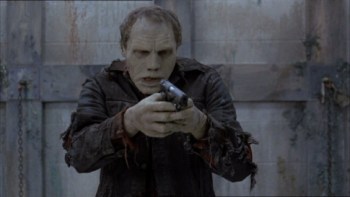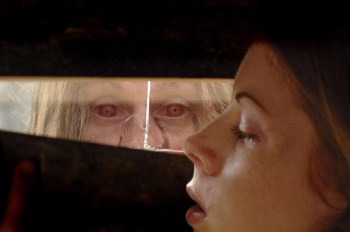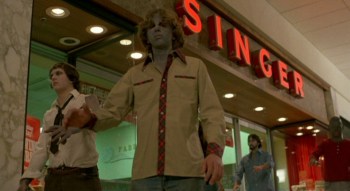(The Projection Booth is hosting a Thirty-One Days of Zombie blog-a-thon all month. Here’s my attempt to understand the appeal of zombies.)
On Zombies
 Among cinematic monsters with any staying power, is there any quite as pathetic as the zombie?
Among cinematic monsters with any staying power, is there any quite as pathetic as the zombie?
They have no special powers. They have minimal identity or personality. Up until 2002, when 28 Days Later and (I’m told) Resident Evil made them fleet of foot, they lumbered around. (Postscript: I’m further told that I’m about a decade off on this point.) In most conceptions, they merely hunger for human flesh.
A single zombie is an easy target. One shot to the brain kills it – permanently, for good this time – in George A. Romero’s world.
It is only their efficient reproduction that gives them any power – the exponential way that four become eight become 16 become 32 become 64 etc. if each only munches on or infects one other person.
 The zombie endures, and is arguably the most potent of creatures in the horror canon.
The zombie endures, and is arguably the most potent of creatures in the horror canon.
Their ubiquity is a function of their malleability. We all know how vampires become vampires, and we all know that Frankenstein’s monster needs the scientist to reanimate it. Just as importantly, those creatures have specific historic/cultural/religious/technological/literary contexts outside of which they become pretty damned silly.
Zombies are liquid, and their uses and origin stories can be tailored to whatever purpose their creator sees fit. With 28 Days Later, Danny Boyle and Alex Garland used a virus to spur the zombie plague. Romero uses zombies the way Scorsese uses De Niro (and now DiCaprio) – they are his refuge and his inspiration. His 1978 classic Dawn of Dead even had a spiritual dimension, with the tagline memorably tying the zombie plague to human wickedness:
“When there’s no more room in Hell, the dead will walk the Earth.”
But their adaptability to a story or agenda or style doesn’t explain why they keep making zombie movies, why we keep watching, and why they will likely be with us forever.
At base, of course, vampires, Frankenstein, and zombies all tap into the same core fears related to death and what lies beyond it. They are different conceptions of a physical existence beyond natural life. These monsters, in their way, represent an exploration of (and revulsion against) the Christian concept of physical resurrection, explicit in the Apostles’ Creed:
“I believe in […] the resurrection of the body.”
 (Not to make too much of it, but zombies – particularly the clumsy, slow variety – are the most realistic of the undead. If, somehow, people came back to life, this is how they would move and act, hamstrung by atrophy and decay, with minimal brain functions and little consciousness – all instinct.)
(Not to make too much of it, but zombies – particularly the clumsy, slow variety – are the most realistic of the undead. If, somehow, people came back to life, this is how they would move and act, hamstrung by atrophy and decay, with minimal brain functions and little consciousness – all instinct.)
But the resurrection angle requires an empathetic reading, suggesting that we are meant to project ourselves onto the monsters rather than their victims. Certainly a great number of vampire tales have encouraged their consumers to understand the agony and despair of eternal life. Zombies don’t work particularly well with that approach, because they’re barely sentient, let alone capable of complex thoughts and emotions. (One exception: Romero’s Land of the Dead.)
One element of zombie movies that makes them alluring is the disposable nature of the monsters, because we can’t see ourselves in them. They’re subhuman and countless and feel no pain, so we can guiltlessly inflict carnage upon them – and guiltlessly watch carnage being inflicted upon them.
But there’s a deeper appeal, one that contrasts the inevitable multitude of zombies with the singularity of the vast majority of movie monsters. Dracula is powerful, but he can be vanquished, and he doesn’t believe in the casual transmission of his condition. The monsters rarely win in horror movies. The narrative is about their defeat, and it reassures us; our fears are assuaged.
Zombies, on the other hand, do not lose in the long run, and any triumph against them is short-lived. They represent the unavoidable victory of death.
We might not draw comfort from that, but it rings true.


Excellent post.
Zombies are pathetic, but what I like about them is the false sense of security they project. They are slow and dumb, but soon enough, the arrogance of the humans causes them to do something stupid and get bitten. So all zombie movies are really about the stupidity of the human race. It is the lack of survival instinct that allows them to spread.
Piper:
That’s an interesting assertion, that zombie movies are about human stupidity. I don’t think I agree with that, in the sense that the protagonists of the original Dawn of the Dead and 28 Days Later showed themselves to be smart and resourceful.
Now, a lot of zombie movies are about human stupidity. I’ll buy that.
Jeff,
I agree with you that the protagonist is smart, but the human race as a whole is stupid. How did the Rage virus get out in the first place? It was created by the government and then it got out by a group of people who thought they were doing the right thing but were uninformed. And in 28 Weeks Later, it is the human race that is responsible for re-releasing the Rage virus.
The virus either comes to be or spreads because of stupidity. In Dawn of the Dead, it is the motorcycle gang that allows the zombies in to the mall and it is the carelessness of Roger that gets him bitten.
Piper:
In pulling back to that level of generality, isn’t pretty much every movie about human stupidity on some level?
Put another way: Is the statement about human stupidity specific to the zombie genre, or can it be applied more broadly to horror movies generally or other types of films?
You know you’re right. It applies to horror in general. Except the Friday The 13th Franchise. Everyone in that movie was a genius.
Piper:
I’d forgotten about Friday the 13th and its sequels — surely only rivaled by the Up series in terms of their humanity and depth.
Particularly smart in the first film was Jack Burrell, who (if memory serves) got a spear through the throat.
Up until 2002, when 28 Days Later and (I’m told) Resident Evil made them fleet of foot
Not to be a zombie pedant, but the trope of the “fast zombie” is memorably birthed in 1992’s Dead Alive (in an error of judgment, the protagonist injects slow zombies with animal stimulant).
Other than that, nice post!
J: My bad. Thanks for pointing out my error.
Piper:
For me, regardless of how zombies are depicted (slow and stupid, quick and calculating) the one thing that fills me with horror is the idea that no matter how well we fight them, we’re eventually going to turn into them (dead, walking or not) one way or another.